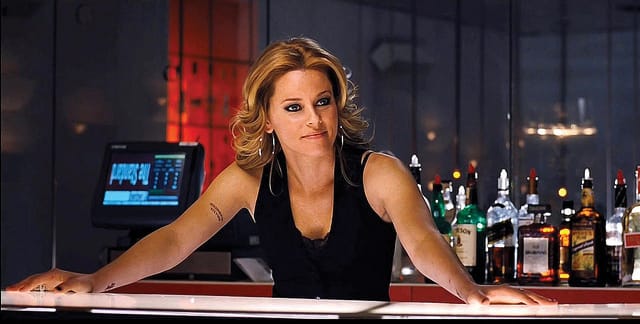He’s just not that into her...nor should he be
People Like Us. Well, nobody should like this.

What happens to selfish, money-hungry, cold, heartless bastards in Hollywood films? They meet a kid. Or they meet a woman. Or both. And oh look, they do have hearts after all, because they’re human – and everybody has a heart, right? There, I’ve just summed up the main story behind People Like Us, a mostly generic dysfunctional family drama that could have served well as a brief story-arc on a daytime soap. But I say “mostly” generic, because the film does try to explore its characters more, not always resorting to stereotypes, and ends on one powerful punch of a finale.
Sam (Pine) is a struggling businessman whose latest deal lands him in a lot of trouble that also costs him financially. To make matters worse he receives news that his estranged legendary record-producing father has passed away from cancer. Although trying to avoid his tense and uncomfortable home, he eventually makes it back to his now very much depressed and disappointed mother Lillian (Pfeiffer). As if his life couldn’t get any more complicated, his father has left a little task for him to complete: a shaving kit containing 150,000 dollars, enough to cover his debts. But the money isn’t for him. It’s for a certain Josh Davis (Michael Hall D’Addario).
The connection? The kid’s mother. Frankie (Banks), a recovering alcoholic as well as bartender, is the mother, who also happens to be the illegitimate daughter of the recently passed record producer. Sam and Frankie are half-siblings. It’s a part of his father’s life that was always kept a secret from him; no surprises there. The only problem is that now it’s up to Sam to carry out this act of kindness to an almost stranger when he can’t even sort his life out. It would be easy to take the money and run. And it’s not as though this thought hasn’t crossed his mind. But he decides to stay put, get close to them for a while, and get to know the family he never thought he had.
Creepy? Perhaps. He is essentially stalking these two. At an Alcoholics Anonymous meeting Frankie announces her disappointment at being completely left out of her father’s eulogy in the papers. “It’s official, I don’t exist” she says, appearing strong although clearly this identity issue is affecting her. And this is a great performance from Banks, an actress who can skillfully pull off sly, sarcastic, confident comedy in a role that could have been hampered by teary melodrama. She has that right mix of cheerful charm as well as strong, intelligent charisma that makes her damaged character fascinating.
It’s Sam and Jack who connect first, through their mutual love of music. Jack is a borderline sociopathic, self-destructive mess, blowing up his school pool with a chunk of sodium and getting into all sorts of trouble. And as Sam appears Jack does miraculously sort out his issues almost immediately. Pine, a likable actor who has his natural ways and a knack for playful wordy dialogue, fits into the role perfectly, showing the progressions and changes of his role with smooth ease. D’Addario also plays delicately with a role that’s not easy to warm to. He carries a lot of built-up resentment and frustration towards his mother, and presents with the classic signs of a neglected, ignored kid wanting some love.
Waiting for the plot to escalate to its inevitable “confrontation” is quite the long one, as the film wants to squeeze in as much sugary sweetness as it possibly can before having to deal with the heavier drama. The feel-good moments are handled with predictable familiarity, mostly with the lovely countryside serving as the backdrop, accompanied by easy, soothing music, where characters move about without dialogue, sometimes in slow motion, laughing and smiling at each other’s company. It’s not a particularly bad concept, and it’s certainly not unpleasant to look at, but sometimes you just want the film to move on and check in with reality.
It’s also an exciting added bonus to see Pfeiffer, whose luminous presence is often underused, playing the heartbroken widow and mother with secrets and regrets of her own to bear. Her unkept exterior, withdrawn, blank looks all work tremendously to fit her role as the grieving woman, giving her scenes much more power as well as tranquillity.
There are scenes of heartstring tugging emotions, some forced, some genuine, but in the end the film manages to find a good balance as it explores a very human, down-to-earth set of characters and relatable plot points. It’s not the most original, and is a touch too long to be a truly compelling drama, but here is a calm, collected and thought-provoking offering that comes far too rarely.





